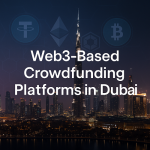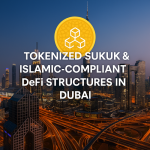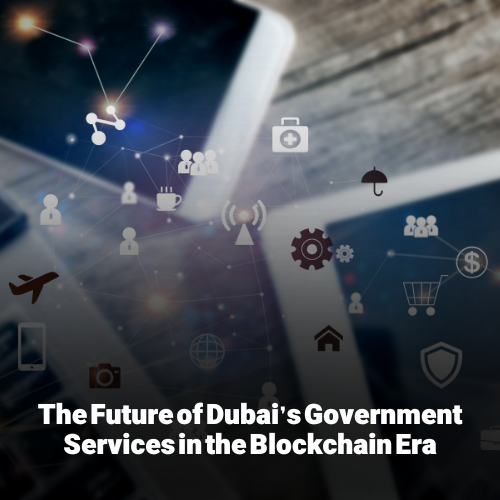Dubai has long been at the forefront of technological innovation, and the city’s government services are no exception. With a clear vision to become a global leader in digital transformation, blockchain in Dubai is increasingly becoming a key enabler of efficiency, transparency, and security in government operations. By harnessing the power of blockchain, Dubai government services on blockchain are about to revolutionize how citizens, businesses, and government agencies interact, offering a glimpse into a future of smarter, more secure, and decentralized governance.
Further, we introduced the Super Block initiative to create car-free pedestrian-friendly neighbourhoods. The Unified Digital Platform initiative was also adopted to streamline government services offered through specialized platforms such as the Dubai Now app, Invest in Dubai for… pic.twitter.com/GZesV9hXqZ
— Hamdan bin Mohammed (@HamdanMohammed) February 6, 2025
As part of its ambitious Dubai Blockchain Strategy, the city aims to implement blockchain technology across all government services by 2025, making it the first city in the world to fully adopt blockchain for public services. In this article, we’ll explore the future of Dubai government services on blockchain, the potential impact of this transformation, and the key advantages blockchain offers to government operations.
Understanding Blockchain and Its Potential for Government Services
I’ve been saying this is coming for a long time.
“Elon Musk, the head of the Department of Government Efficiency (DOGE), is reportedly exploring implementations of blockchain technology in US government operations to track and reduce federal spending.
According to Bloomberg, the…— JoeLange (@JoeLang51440671) January 27, 2025
Blockchain technology is essentially a decentralized, transparent, and immutable digital ledger that records transactions across multiple computers. What makes it powerful for government services is its ability to securely store data, verify transactions in real-time, as well as eliminating the need for intermediaries. Blockchain ensures that once information is recorded, it cannot be altered or tampered with, making it an ideal solution for managing sensitive government data, contracts, and public records.
In the context of Blockchain services in Dubai Government, this technology has the potential to streamline processes, reduce inefficiencies, and enhance the security and trustworthiness of government services. As a result, Dubai government services on blockchain will offer enhanced transparency, cost savings, faster processes, and better service delivery to citizens and businesses alike.
Key Areas Where Blockchain Will Transform Dubai’s Government Services
The adoption of blockchain in Dubai government services aims to impact several key areas, reshaping how citizens and businesses interact with public institutions. Below are some of the primary areas where blockchain will drive significant improvements:
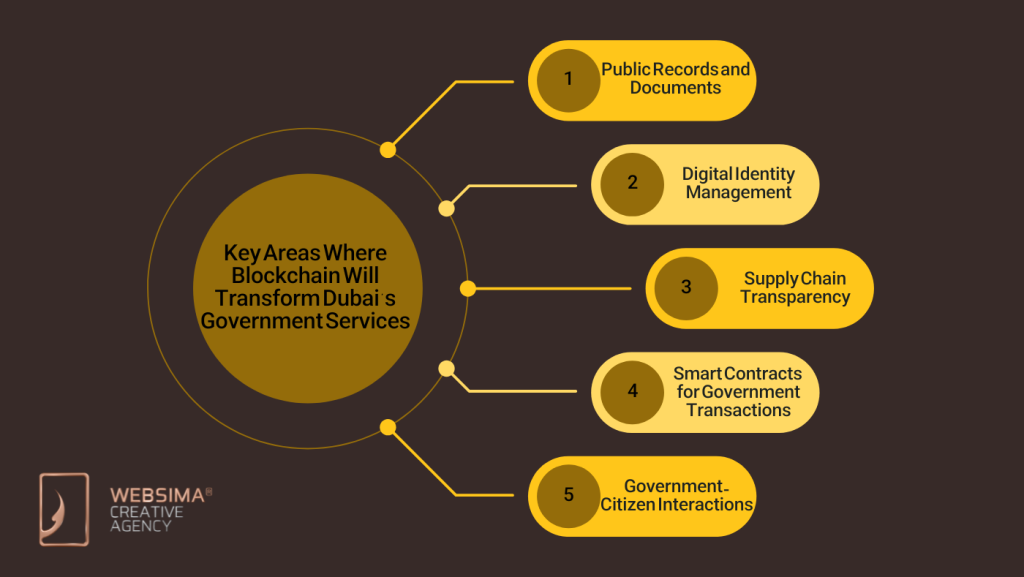
1. Public Records and Documents
One of the most promising applications of blockchain technology in government services is the management of public records. Blockchain’s ability to provide a secure, immutable ledger makes it an ideal solution for storing important records such as birth certificates, property deeds, and marriage licenses.
In Dubai government services on blockchain, citizens will be able to access and verify public records in a secure and transparent way, without relying on traditional methods that often involve lengthy bureaucratic processes. Blockchain-based public records will reduce the chances of fraud and provide a single source of truth.
For example, the Dubai Land Department has already implemented blockchain to record real estate transactions, enabling faster and more secure property transfers. As blockchain technology becomes more widespread in Dubai’s public sector, the management of other critical documents, such as medical records and educational certifications, will also transition to blockchain-based systems.
2. Digital Identity Management
As more services move online, secure digital identities have become essential for protecting citizens’ personal information and ensuring the integrity of government transactions. Blockchain technology is a game-changer in this space, as it enables digital identity management that is decentralized, secure, and tamper-proof.
The Dubai government has already initiated several projects aimed at creating a unified digital identity for its residents. With blockchain, Dubai government services on blockchain will allow citizens to access public services using a secure digital identity that can be verified without the need for multiple authentication processes. This will enhance user convenience while ensuring robust security, protecting citizens from identity theft, and enabling seamless interactions with government services.
3. Supply Chain Transparency
Blockchain offers significant advantages in areas like supply chain management, particularly for government procurement and public projects. By leveraging blockchain in Dubai, the government can ensure greater transparency, reduce fraud, and improve accountability in supply chains.
For example, blockchain is applicable to track the procurement process from start to finish, providing a transparent and immutable record of every transaction, contract, and delivery. This can be particularly beneficial in sectors like construction, where projects often involve multiple stakeholders and complex supply chains. With blockchain, Dubai’s government can ensure that public projects are executed efficiently, resources are allocated properly, and contracts are honored.
4. Smart Contracts for Government Transactions
Smart contracts, which are self-executing agreements with the terms of the contract directly written into code, are another key application of blockchain technology in Dubai government services. These contracts automatically execute when predefined conditions are met, eliminating the need for intermediaries and speeding up the process.
The Dubai government is already experimenting with smart contracts in areas like land transactions, where a smart contract can automatically execute a property sale after meeting certain conditions, such as payment confirmation. This reduces the time and cost associated with traditional contract management and ensures that agreements are executed in a timely and transparent manner. However, Dubai’s legal framework for smart contracts still needs more clarification and polishing.
5. Government-Citizen Interactions
The Dubai government’s vision is to enhance its digital offerings by integrating blockchain into public services, making interactions more efficient and streamlined. Citizens will benefit from quicker processing times for government services, as well as the ability to track the status of applications and requests in real time.
For instance, blockchain in Dubai is usable to enhance visa processing, permit applications, and tax filings. Blockchain will enable residents and businesses to submit applications securely and monitor their progress without having to rely on paperwork or visit government offices. The ability to access public services quickly and securely will improve the overall citizen experience and foster greater trust in government institutions.
Advantages of Blockchain for Dubai Government Services
The integration of blockchain into Dubai’s public sector brings with it numerous benefits that will fundamentally reshape government services:
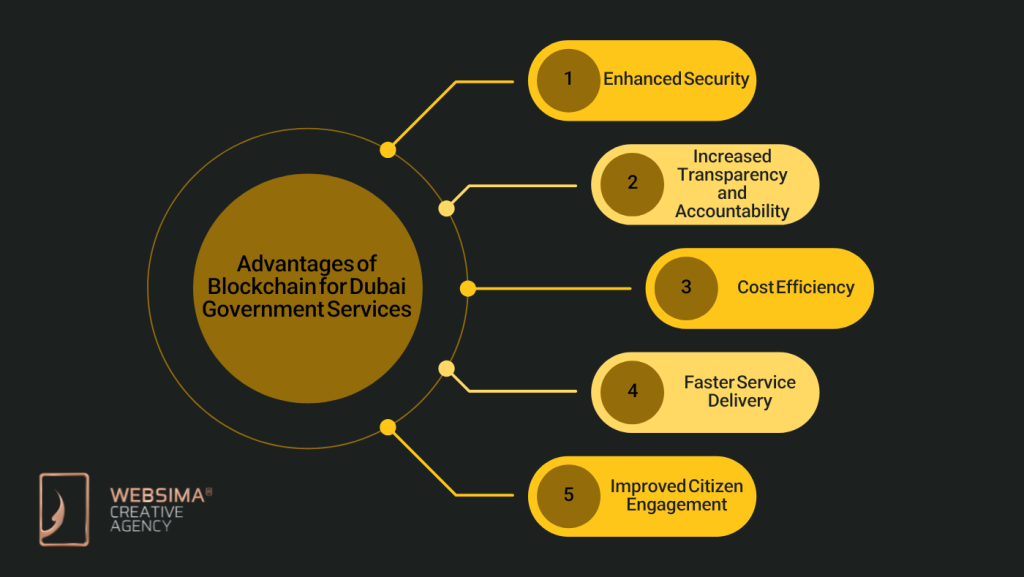
1. Enhanced Security
Blockchain’s decentralized and immutable nature ensures that government data is secure from tampering, fraud, and cyberattacks. Unlike traditional centralized databases, blockchain ensures that no single entity has control over the data, in order to reduce the risk of data breaches and unauthorized alterations.
2. Increased Transparency and Accountability
Blockchain provides a transparent and auditable ledger of all transactions, which is visible to all authorized participants in the network. This transparency ensures that government activities, such as public procurement, land transfers, and contract management, are open to scrutiny, increasing accountability and reducing the potential for corruption.
3. Cost Efficiency
By eliminating the need for intermediaries and reducing administrative overhead, blockchain can significantly reduce the costs associated with government operations. For example, Dubai government services on blockchain will reduce the need for paperwork, physical document storage, and time-consuming administrative processes. This results in both direct cost savings and more efficient resource allocation.
4. Faster Service Delivery
Blockchain allows for faster processing times by automating key government functions. Whether it’s executing a smart contract, verifying a public record, or processing a digital identity, blockchain ensures that government services are delivered swiftly and efficiently in order to improve the overall citizen experience.
5. Improved Citizen Engagement
Blockchain technology offers citizens more control over their personal data and digital identity. By integrating blockchain into public services, Dubai can provide a more secure and user-centric approach to government engagement. This will enhance trust between the government and its citizens, fostering a sense of participation and ownership in the governance process.
The Road Ahead: The Future of Blockchain in Dubai Government Services
As Dubai continues its journey to becoming the world’s first blockchain-powered government, the future of Dubai government services on blockchain looks incredibly promising. By 2025, it is expected that blockchain will be integrated across all government departments and services in order to create a seamless and efficient digital ecosystem for residents and businesses.
The potential applications for blockchain in Dubai’s government services are vast, ranging from smart cities to digital health records, and the city’s blockchain strategy is already laying the foundation for this transformation. As more services are digitized and integrated with blockchain, Dubai will not only improve the efficiency of its government operations but also establish itself as a global leader in digital governance.
In the years ahead, Blockchain services in Dubai Government will continue to evolve, with new innovations and solutions. Hence, the future of blockchain in Dubai’s legal sector seems to be on a growing trend.
Conclusion: Embracing the Blockchain Future in Dubai’s Government Services
The future of Dubai’s government services in the blockchain era promises a smarter, more secure, and more efficient public sector. With blockchain in Dubai serving as the backbone of these transformations, Dubai government services on blockchain will set new standards for how governments interact with citizens and businesses.
As the city continues to lead in blockchain adoption, entrepreneurs, developers, and government agencies alike will have the opportunity to be part of this exciting transformation.
Websima, as the leading blockchain service provider in Dubai, is more than happy to help, if you are planning to start a blockchain-based business in Dubai. Blockchain, crypto and web3 web and website development, smart contract programming and development, Blockchain, Web3 and crypto company establishment are just a few out of many services that we provide. Feel free to contact us to book for a free consultation meeting with our talented team.

